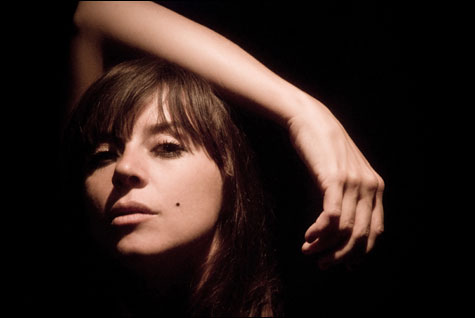
RISKY BUSINESS: Whatever the psychodramas of Cat Power’s past live shows, the music on Jukebox is anything but fragile. |
On Cat Power’s Jukebox (Matador), her second album of covers, Chan Marshall might be traveling the same territory Elvis did in “Kentucky Rain” — a country road with low clouds pressing down on a chill, gray afternoon. Her voice comes at you as if from a flatbed truck as it goes around the bend up in the distance — it hits you on the rebound. By the time the vocals reach your ears, Marshall is gone. The drama of the songs is in the past. What she gives you is the shredded equilibrium of someone living in the aftermath. On Jukebox, even when she’s most direct, most urgent, her presence is defined by an absence. You don’t hear the hurt as much as you do the wound.Marshall includes the lines “I once was lost but now I’m found/Was blind but now I see” from “Amazing Grace” in her own “Metal Heart” (one of the two songs she wrote on the album), and by now no one should be able to bring anything new to that hymn. But she strips the sense of transcendence and deliverance that the lines usually express. Instead she offers them up as plain accounting of her state, in the manner of someone not hiding from her past but not dwelling on it, either.
The notorious psychodramas that used to make up Marshall’s live shows have become an unfortunate part of her public image. Various profiles in the last few years have talked about the emotional grounding she’s achieved. I’ve never seen Marshall live (she plays Thursday, February 7, at the Orpheum), and I may be alone on this, but, without denying the emotion of these performances, what I hear on Jukebox is anything but fragile. At times it’s akin to the narrative voice you find in the best American hard-boiled writing, maybe one that could speak these lines from David Goodis’s The Wounded and the Slain: “I’m trying to be something, so that wherever you are, you can say to yourself that it wasn’t a waste of your heart and your life.” The gamble that it might all be for nothing is implicit, and so — in Marshall’s best moments, the last-woman-standing defiance of Bob Dylan’s “I Believe in You,” the that’s-the-way-it-is acceptance of her take on Spooner Oldham & Dan Penn’s “A Woman Left Lonely” — is her willingness to risk that.
But if Jukebox is Marshall’s hard-boiled novel, it’s one where the action has shifted to the country. Maintaining the soul sound she got on 2006’s The Greatest by working with people like Al Green’s guitarist Teenie Hodges (who guests here), Marshall and her four-piece band impart the feel of jukes on lonely wet afternoons, or hours past closing time when the band members are playing for themselves. It’s a low, slow groove that might be coming out of the bodies of the musicians as much as their instruments — echoey, held back even at its most intense, every note sung or played with a determination not to force anything.
 Topics
Topics:
Music Features
, Elvis Presley, Entertainment, Music, More  , Elvis Presley, Entertainment, Music, Music Reviews, Cat Power, Bob Dylan, Paul Simon, Joni Mitchell, Shelby Lynne, Al Green, Less
, Elvis Presley, Entertainment, Music, Music Reviews, Cat Power, Bob Dylan, Paul Simon, Joni Mitchell, Shelby Lynne, Al Green, Less 